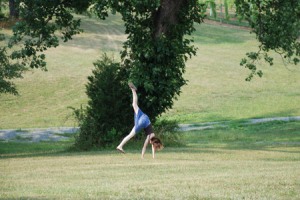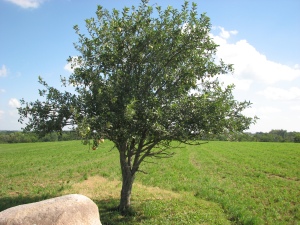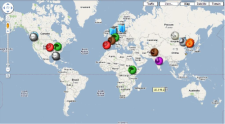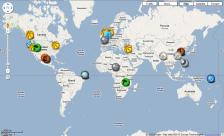Next morning MV was woken by singing. Cursing, he went to the window. He’d been up half the night catching up with pips and downloads. Just a few hours away from his ZiSleeve was lethal. It mustn’t happen again.
Out of the window the garden looked resplendent in the morning sunshine. Tripping through it barefoot was his nemesis, that temptress Rada. It looked like she was singing to the flowers. Bloody hell—what a kook! Colleen had made such a mistake bringing them to this Godforsaken place.
Well it must be near midnight in New York—time for a game before Jeezbob hit the sack. He closed the curtain. Jeezbob had manoeuvred him into a cave full of unexploded mines, and the sound of whizzing, banging and explosions drowned out that wretched singing.
A shaft of sunlight slipped through a crack in the curtain and caught his face. Dammit. It reminded him of the sparkle on Rada’s pearly teeth. He went to the window. Oh God she was cartwheeling again. As she came up, she spied him.
“Come, come outside! It is so wonderful out here.” He was torn. Then he saw the quote above his door.
If we don’t change our direction, we’ll wind up where we are headed.
Boy, was this place trying to brainwash him? He decided to take his ZiSleeve with him. As protection.
“Oh okay, but I’m not doing any more cartwheels.”
“Of course not—I want to show you the gardens.”
“Just for a short while.” Out he went, armoured with his ZiSleeve.
The garden was bursting with vegetables and flowers. Cabbages the size of footballs swelled out among a riot of nasturtiums.
“You grow all your own vegetables?”
“Yes, and fruits, and healing herbs. We use permaculture techniques.”
“Do you guard your gardens?”
“No.”
“Why not?” In LA, gardens had sprouted everywhere—disused lots, sides of roads where guerrilla gardeners had to become more guerrilla-like to protect their produce. MV earned extra money by patrolling gardens at night, entertained by his ZiSleeve of course.
“Well Miroslav.” She lowered her voice as she said his name. Despite himself he thrilled at the way she pronounced it. “We have plenty of gardens in Russia. And land. You must remember the Soviet Union collapsed twenty years before the world financial crash of 2009. Fortunately most people, even those in the cities, still had access to a dacha and garden. In the early 1990s while Russia boiled out of control in a soup of intrigue, power and greed, these gardens saved Russia from starvation and possibly another revolution.”
“Revolution may have been a good thing.”
“No Miroslav—our country was worse than a battered, bloody dog after seventy years of revolution. In 1995 there emerged from the Siberian Taiga my heroine, the eco-mystic Anastasia, who persuaded hundreds of thousands of people to turn away from the transient attraction of luxury consumer goods, and delight in the simple pleasures of planting seeds and creating gardens. By the time Capitalism cracked apart, President Medvedev was passing legislation for people to acquire land cheaply, so they could be self-sufficient. What was great was that these people were well educated and technically literate and brought their new knowledge to the land. My parents were successful city people who became quickly disillusioned with a Western copycat lifestyle; they traded their concrete coop in Moscow for an eco-house in the countryside, at first commuting while they built it.”
Her eyes sparkled as she spoke of her parents. “Oh Miroslav I wish I could take you to visit them, so you could eat one of the apples from the tree they planted when I was born. It would help your skin condition.”
MV looked at the rosy flush of her skin and longed to touch it—to somehow infuse it into his own.
“So what is so special about this school?” He had avoided going to Shchetinin’ s talk, pleading Zi overload.
“We learn how to create a positive future.”
“How?”
“In many ways, but basically by relating to each other and thinking.”
“Thinking?”
“Yes, most people only use a fraction of their thinking capabilities.”
“Well I don’t. I think all the time.”
“Miroslav, you never have time to think—a slave to your ZiSleeve.”
“I’m thinking the whole time—responding to hundreds of pieces of info every day, through my live-Stream.”
“Just Nowism; downloading data. Reacting. Not retaining it.”
“Yes I am.”
“I doubt that. When do you contemplate deeply, sharpen your understanding—ponder whether something optimal in the present may not be optimal in the future? Do you observe nature for example? Work out the true laws that govern everything?”
“Well—er…” MV thought of his mother who commented sadly that old-fashioned daydreaming had disappeared?
“Well Miroslav—the deep, quiet thinking process is alien to many today because of the influence of the technocratic world. People spend their entire life marshalling their thoughts towards using and creating better widgets and gadgets. You are seduced by these substitutes for real life.”
MV’s Wii injury throbbed. His ZiSleeve winked and beeped.
“Substitutes! You’re unbelievably arrogant! You should have seen the amazing devices at the Expo. Technology that will save our planet.”
“Miroslav, the planet needs greater consciousness, reflective awareness, not just technical fixes.”
But MV was back at Moscow’s Crystal Island. His eyes glazed over. “You should have seen the robots.”
“Just clever inventions, nothing more.”
“Inventions? Robots will take over.”
“Only the brains behind them will take over. Our brains. Technology is created by us; by our thoughts. It is us humans who are amazing. Robots, at best, are useful servants.
“Look at this ZiSleeve! I can get any piece of information I want at any time. I’m being better educated than anyone in mankind’s history.” MV’s Zi bleeped obligingly in emphasis. “I’m proud to be part of a cross-fertilisation that’s driving a generation of new scientific knowledge and technological innovation at an unprecedented rate.”
“Yes that is good—it makes you flip from topic to topic easily and you learn a lot quickly, but it also makes you lazy. Your mind is continually searching for input—the latest disaster, the latest news, the latest—what do you call it? Thrill.” She pronounced it ‘T’rill.’
MV had to acknowledge that point. Each day brought an exciting breaking news story on ZiNet—plenty of them—cyclones, fires, riots, floods, sieges. There was even a special part of YouTube called SiegeTube where people could tune into their own reality siege. It felt dull if a day went by without a disaster to tune into.
“But it’s good to be tuned into the world. I’m connected to millions of people in real time. Live-streaming.”
“Real time? A delusion. Just an impression of real life. Live-streaming enslaves you to the web. Why are we here? How can we save the planet? How do we relate to each other? They are the real time questions.”
“I am relating to others all over the globe. Strangers reach out to each other—open up, express themselves more easily. I respond to so many people.”
“Yes but you never have time to deeply ponder. You are mesmerised by the web like a baboon is to a red bottom. Easily led. Never stopping to think.”
Picture credits:
- Skinput: via the Daily Mail;
- Cartwheels: via Kthread;
- Apple Tree 1: via Passport to the Past;
- Photovoltaic Bin Sorting Robots: via Automation;
- Internet 1: via Kazete;
 Eva Maria Chapman has successfully pursued a variety of careers; teacher, academic, psychotherapist and director of an energy efficiency company. In her career as author, she is a genre hopper. Her first book Sasha & Olga, a memoir, charts the adversities of her Russian refugee family, before and after emigrating to Australia; her second, Butterflies & Demons, unveils the extraordinary past of the Kaurna Adelaide Aborigines, combining historic fiction with fantasy. ‘Russian Roulette 2020’ is her first foray into Science Fiction and has inspired her to embark further into this genre. She is now writing an optimistic novel set in the future. She lives in happy seclusion in a wildlife sanctuary on the edge of Exmoor, England, with her husband Jake. When not writing, or growing vegetables, she likes to make (and wear) hats, party with friends, and frolic with her grandchildren.
Eva Maria Chapman has successfully pursued a variety of careers; teacher, academic, psychotherapist and director of an energy efficiency company. In her career as author, she is a genre hopper. Her first book Sasha & Olga, a memoir, charts the adversities of her Russian refugee family, before and after emigrating to Australia; her second, Butterflies & Demons, unveils the extraordinary past of the Kaurna Adelaide Aborigines, combining historic fiction with fantasy. ‘Russian Roulette 2020’ is her first foray into Science Fiction and has inspired her to embark further into this genre. She is now writing an optimistic novel set in the future. She lives in happy seclusion in a wildlife sanctuary on the edge of Exmoor, England, with her husband Jake. When not writing, or growing vegetables, she likes to make (and wear) hats, party with friends, and frolic with her grandchildren.
Also, check out the exclusive interview Charles A. Tan did with her at SF Signal.
Review Quotes:
Eva Maria Chapman’s Russian Roulette 2020 genuinely took me by surprise. I truly enjoyed her writing style and the voice of her characters. Set in the very near future, it focuses on a group of high school children who have come from an intensely high tech community to spend time at one of Russia’s ground-breaking schools where technology is not the main focus of their every day lives. Chapman writes eloquently of how difficult the kids find it to relate to being outside, to talking to each other and their guides at the school, when they’re more used to being linked into a the wider world and conversing by message with others all over the world. A very interesting, sobering look at how technology invades our lives. Oh, and there is a wonderful budding romance and I adored it. More please?
—SF Revu;
Russian Roulette 2020 by Eva Maria Chapman touches upon the social media phenomenon, too, in that it recounts the story of a group of teens who are compelled to disengage from their cyber-existences and fully engage with reality. The story made me consider how you might blend science fiction with traditional fantasy using virtual worlds. Or maybe even put a new spin on historical fiction.
In Russian Roulette 2020 by Eva Maria Chapman we get to see the downside of all that instant access. People are consumed by the present, constantly in touch and responding to what is happening elsewhere. A group of American technology addicts encounters a Russian school where they live and teach according to a different philosophy. The group does not shun technology but clearly thinks a connection with the land and your community is equally important. It’s one of the more spiritual stories in the collection. What I particularly liked about it, is that the contrast the author is trying to create between the two groups does not result in one of them completely ignoring the possibilities of technology. It’s about balance. Technology has its uses as both groups will find out in the story.
In Eva Maria Chapman’ s Russian Roulette 2020, for example, a blasé teen’s quick-fix addictions dissolve over the course of a slushy summer-camp romance with an insufferably twee hippy.
Russian Roulette 2020 by Eva Maria Chapman for example falls into the trap of utopian didacticism as the protagonist is reduced to merely being a foil in what is a one-sided narrative.
An interactive Google Map of story locations from the SHINE anthology:


























Pingback: SHINE: the Table of Contents « DayBreak Magazine
Pingback: SHINE: the Table of Contents « Shineanthology’s Weblog
Pingback: SHINE Released! « DayBreak Magazine
Pingback: Awards Pimpage: SHINE stories + Three Real-Life Links « Shineanthology’s Weblog